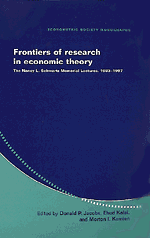Book contents
- Frontmatter
- THE LECTURES
- 1 The Economics of Incentives: An Introductory Account (1983)
- 2 On the Theory of Perfect Competition (1984)
- 3 On the Role of "Dutch Books" in the Theory of Choice Under Risk (1985)
- 4 Rationality and Bounded Rationality (1986)
- 5 On the Mechanics of Economic Development (1987)
- 6 Knightian Uncertainty (1988)
- 7 Evolution, Learning, and Economic Behavior (1989)
- 8 Experimental Economics: Behavioral Lessons for Microeconomic Theory and Policy (1990)
- 9 Habits, Addictions, and Traditions (1991)
- 10 Issues in Social Insurance (1993)
- 11 Negotiation with Private Information: Litigation and Strikes (1994)
- 12 Economic Survival (1995)
- 13 Shirtsleeves to Shirtsleeves: The Economics of Social Mobility (1996)
4 - Rationality and Bounded Rationality (1986)
Published online by Cambridge University Press: 05 January 2013
- Frontmatter
- THE LECTURES
- 1 The Economics of Incentives: An Introductory Account (1983)
- 2 On the Theory of Perfect Competition (1984)
- 3 On the Role of "Dutch Books" in the Theory of Choice Under Risk (1985)
- 4 Rationality and Bounded Rationality (1986)
- 5 On the Mechanics of Economic Development (1987)
- 6 Knightian Uncertainty (1988)
- 7 Evolution, Learning, and Economic Behavior (1989)
- 8 Experimental Economics: Behavioral Lessons for Microeconomic Theory and Policy (1990)
- 9 Habits, Addictions, and Traditions (1991)
- 10 Issues in Social Insurance (1993)
- 11 Negotiation with Private Information: Litigation and Strikes (1994)
- 12 Economic Survival (1995)
- 13 Shirtsleeves to Shirtsleeves: The Economics of Social Mobility (1996)
Summary
I am honored to present this lecture in tribute to Nancy L. Schwartz. I did not know Professor Schwartz well, yet I am aware of her important professional contributions. First and foremost are the direct advances to the profession made through her writings. But also her indirect contributions, as a teacher and an intellectual leader, are very important. Some of the ideas and applications discussed in this lecture were developed in the excellent department she helped build.
INTRODUCTION
Economists have for long expressed dissatisfaction with the complex models of strict rationality that are so pervasive in economic theory. There are several objections to such models. First, casual empiricism or even just simple introspection leads to the conclusion that even in quite simple decision problems, most economic agents are not in fact maximizers, in the sense that they do not scan the choice set and consciously pick a maximal element from it. Second, such maximizations are often quite difficult, and even if they wanted to, most people (including economists and even computer scientists) would be unable to carry them out in practice.
- Type
- Chapter
- Information
- Frontiers of Research in Economic TheoryThe Nancy L. Schwartz Memorial Lectures, 1983–1997, pp. 47 - 60Publisher: Cambridge University PressPrint publication year: 1998
- 1
- Cited by



